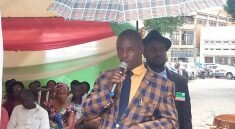BUJUMBURA October 2nd (ABP) – The Minister of Human Rights, Social and Gender Affairs, Mr. Martin Nivyabandi, organized a news conference in Bujumbura on Monday, September 30, 2019, to present the conclusions of the 42nd session of the Human Rights Council held in Geneva, Switzerland on September 27, 2019.
The Human Rights Council voted, in Geneva on Friday, September 27, 2019, the resolution on Burundi which is aimed at extending the term of Doudou Dieng, chairman of the UN commission on human rights in Burundi, said the Burundi minister in charge of Human Rights, adding that the same resolution was supported by the European Union (EU) countries and its allies, including an African country, Rwanda.
Minister Nivyabandi said that what is interesting in doing the analysis is that the number of countries that voted against this resolution, compared to 2018, increased from 7 to 11. He added that this is a sign of objectivity proving that those countries have understood that the EU gives incorrect explanations on the situation prevailing in Burundi.
After the vote on that resolution, Mr. Nivyabandi said that the Government of Burundi took that opportunity to explain to the various delegations present in Geneva the situation prevailing in Burundi, arguing that the country is calm, respects the human rights and is internationally recognized as a promoter and defender of human rights.
According to Minister Nivyabandi, the defense of human rights is a responsibility of the authorities in the interests of the people, and the defense of human rights is not promoted to satisfy the international community, but to satisfy the citizens. He said that the Burundi government will not cooperate with that commission, which he describes as illegitimate and which is established by the EU while the commission led by Dieng has shown the wish to perpetrate neocolonialism, which is impossible today, he stressed.
The minister in charge of human rights also said that the Burundi government and its citizens are preparing for the 2020 general elections. “This is the only way to consolidate democracy, renew the governing bodies, promote and defend human rights,” he explained.
He said he was satisfied with the usual behavior of politicians from different political parties in Burundi who meet regularly to discuss different subjects without taboos, which is a sign that the elections will be transparent and will contribute to the development of Burundi.





